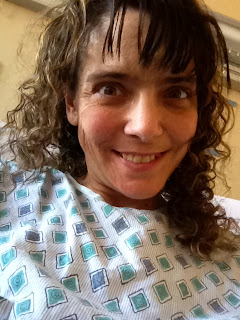I went to the doctor last week. It seemed uneventful, but afterwards I was left confused.
First, I had an ultrasound to check status on my blood clot. As always, the first tech needed to get it reviewed after taking forever to get the first set of pics. He came back with a second tech and ultimately brought the radiologist in. The radiologist said he believes the clot is not in the artery going to my pancreas(as was previously concluded) and the the clot is still the same size. I understand the same size part(not good news), but I don't get the "not in the artery" part. I'll need to consult my doctor.
At my clinic appointment, my nurse reviews medication and expresses concern over my recent weight gain. I had first thought very little of it, but she's right, its extreme. I have gained 12 pounds in two weeks...ugh. She tells me to look in the mirror and notice that my face is swollen and round; I have "moon face." Linda explains to me that these are side effects of the prednisone I am taking. I'm still not too concerned, thinking I'll be able to exercise any additional weight off.
Dr Jonnson, who I met once while hospitalized, comes in, asks a few questions, and basically I am ok...Yay! He lowers my coumadin dose because my blood is now getting too thin. Everything else is stable. I ask him about the blood clot. He tells me not to worry - if its not in the artery, it wont affect my pancreas and kidney, which are functioning great. He tells me to schedule an appointment with my nephrologist next month and that I am beginning the transition from the transplant clinic back to my nephrologist. "Merry Christmas," he says. "Come back in three months."
Linda asks me if I have more questions. I do...what about the clot? I'm wondering if its not in the artery, where is it? Linda explains to me its therefore in a vein. Ummm...I remember reading that the risk of a venous clot is that it can break loose, return to the heart and cause a pulmonary embolism. I am confused as to why the doctor said not to worry. Linda explains to me that if it doesn't affect the transplanted organs, its not a big concern to the transplant doctor.
Wow...I'd like to avoid a blood clot blocking blood flow to my heart or lungs. Good news is that, despite a lot of coumadin, the clot hasn't decreased or moved yet. I need more answers. Linda promises to get me some more information.
The next day, Linda calls me to let me know she went over my lab results with Dr Wali, who is much more familiar with me, and he wants me to come back in three weeks and to continue weekly labs. I feel reassured that he's going to look over everything.
When I get home, I look up venous blood clots and side effects of prednisone. I don't find anything definitive on clots and the prednisone info is disappointing. Essentially, not much can be done about the weight gain and will probably take a long time to lose it after coming off the medication. I am disappointed. I have worked hard to get where I am physically and I feel it slipping away.
 Hmmm. Now I know what my New Years resolution is. I need to make a healthy, regular exercise program a priority. I need to focus on the fact that my lab results are good, my kidney and pancreas are working great and I am way healthier than I was before.
Hmmm. Now I know what my New Years resolution is. I need to make a healthy, regular exercise program a priority. I need to focus on the fact that my lab results are good, my kidney and pancreas are working great and I am way healthier than I was before.
I smile a pudgy, swollen cheek, purposeful smile.
I will control what I can and let go of what I can't.












